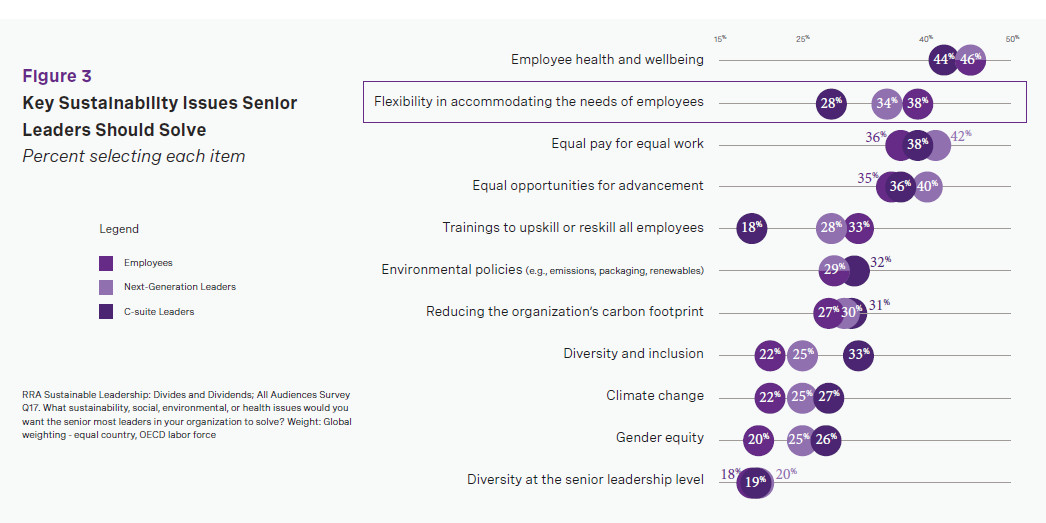|
When it comes to environmental sustainability, what CEOs say is markedly different from what employees see them do. Researchers at the leadership advisory firm Russell Reynolds Associates call this discrepancy the 'Say/Do Divide,' which they looked to quantify in a recent survey of employees and executives. While 69 percent of the C-suite executives surveyed said they are personally committed to advancing sustainability and their organizations are making progress, only 31 percent of employees said the same. Similarly, only a quarter of U.S. employees believe their most senior leaders demonstrate humility or self-awareness and only a third believe senior leaders display empathy, humanity and inclusivity.'The Say/Do Divide has two possible dimensions: organizations are not taking sufficient action or they are not properly communicating their efforts,' the researchers concluded. 'It is imperative for business leaders to determine which factors are at play at their organization. This includes a thorough analysis of the level of emphasis they place on sustainability — and whether these efforts are enough — and how well these actions are both communicated to and understood by employees.'
Figure 1
Sustainability Issues Affecting Future of Society
Rank of percent selecting each item as top 3 issue (from
list of 16 issues)
RRA Sustainable Leadership: Divides and Dividends; All Audiences Survey
Q1. In your opinion, what are the most important sustainability issues affecting the future of our society? Top 3;
Weight: Global weighting - equal country, OECD labor force
RRA Sustainable Leadership: Divides and Dividends; Senior Leaders Survey
Q1. In your opinion, what are the most important sustainability issues affecting the future of our society? Top 3
Environmental Economic Social
Rank EMPLOYEE PERCEPTION Rank C-SUITE LEADERS PERCEPTION
Climate change
Pollution
Global pandemics
Deforestation and loss of bio-diversity
Throw-away culture
Economic inequalities
High-level of corruption and abuses of power
Material and food waste
Unequal access to healthcare and health education
Racial and social injustices
35%
34%
32%
23%
22%
21%
21%
18%
15%
14%
Global pandemics
Climate change
Pollution
High-level of corruption and abuses of power
Deforestation and loss of biodiversity
Material and food waste
Economic inequalities
Gender inequity
Geo-political conflicts or trade wars
Racial and social injustices
Figure 2
Sustainability Issues Affecting Your Employer and
Workplace
Rank of percent selecting each item as top 3 issue (from
list of 16 issues)
RRA Sustainable Leadership: Divides and Dividends; All Audiences
Q2. What are the top five most important sustainability issues affecting your employer and your workplace today?
Environmental Economic Social
15% 50% 25% 40%
28%
36%
35%
33%
30%
25%
25%
25%
32%
31%
34%
42%
40%
28%
27%
22%
22%
20%
20%
19 18 % %
38%
38%
36%
18%
44% 46%
29%
33%
27%
26%
Rank EMPLOYEE PERCEPTION
44%
32%
27%
21%
20%
20%
19%
17%
17%
14%
Global pandemics
Shortage of workers with in-demand skills
Economic inequalities
Throw-away culture
Material and food waste
Pollution
Gender inequity
High-level of corruption and abuses of power
Climate change
Unequal access to quality education
Rank C-SUITE LEADERS PERCEPTION
33%
24%
22%
21%
19%
19%
18%
18%
17%
16%
Global pandemics
Shortage of workers with in-demand skills
Climate change
Pollution
Economic inequalities
Gender inequity
Material and food waste
Throw-away culture
High-level of corruption and abuses of power
Unequal access to quality education
Top 3; Weight: Global weighting - equal country, OECD labor force
RRA Sustainable Leadership: Divides and Dividends; Senior Leaders Survey. Q2. What are the top five most
important sustainability issues affecting your employer and your workplace today? Top 3
| |


